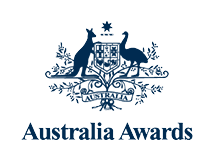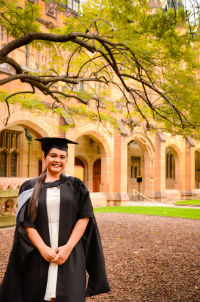Making a Difference Through Peace Journalism by Primy Cane
Primy Cane has just completed her Master of Peace and Conflict Studies from the University of Sydney through the Australia Awards Scholarships. She writes about her goals as a journalist and her learning experience in Australia to commemorate the International Day of Peace on 21 September.
An ambitious girl, I have always wanted to make a difference in my community and in the world. In the Philippines, the general belief is that unless you have a lot of money or power, you cannot do that. So I chose a career in journalism, which, while not overabundant in either money or power, helped me keep a finger on the pulse of society.
In my first few years as a journalist, I realised that the pen or the microphone I held in my hands truly is mighty but its potential was not being maximised. For example, reporting on the Christian-Muslim conflict in Mindanao didn't seem to contribute to the resolution of the violence. I began to question my purpose and my role in the bigger picture. Was journalism making a difference? In my pursuit to discover my job’s greater potential, I decided to learn about Peace Journalism.
My Australia Awards Scholarship gave me the opportunity to choose from any school in Australia, so I started checking out the units offered and the profiles of the people teaching them. The classes for the Master of Peace and Conflict Studies course at the University of Sydney, especially the Conflict-Resolving Media unit were exactly what I was looking for. I was impressed that Dr. Jake Lynch and Annabel McGoldrick, the teachers for the unit, had done research in my country.
During the course of my studies, I realised that I was unconsciously contributing to the problem.
I did not know that using language such as ‘clean up’ or ‘clearing operation’ contributed to a dehumanised view of the other. These are human beings being hunted and killed. They are not bits of broken glass on the floor that you sweep up.
I did not know that interviewing only one side of the conflict and neglecting the other aggravates the differences between the parties and distorts facts. You have to be careful who you give the microphone to and be wary of becoming the mouthpiece for propaganda.
I did not know that the way you write your story (whether you choose to end it in a ‘which side won and which side lost’ style, or with what solutions the authorities or individuals are coming up with to end the violence) can affect how people feel after seeing or reading it. Do you leave them with a sense of helplessness and depression? Or will your story encourage people to try and help, and leave them feeling that all is not yet lost?
Peace Journalism is providing something more than the answers to who, what, when, where, how and why, it should help people understand a situation in its entirety. After learning about it in my Conflict-Resolving Media class, I am happy that I now possess some knowledge for becoming part of the solution.
I studied this degree hoping that I would return to my country a better-rounded journalist. I am positive that what I learned in the practice of conflict-resolving media, trauma healing, and about what causes conflict in the first place, can be applied in the field to result to more responsible journalism.
Media has a big role to play in breaking the cycles of violence. After the atrocity has taken place, there will be shock and terror, fear and pain, grief, then anger, and then bitterness. It is at this point, before revenge and retaliation which leads back to atrocity, that intervention is needed. Peace Journalism can promote peace in times of conflict by giving all parties a chance to air their sides and promote understanding. After discovering this I felt a sense of renewed hope. Here, at last, is my opportunity to make a difference by helping end the cycle of violence.
I do not want to be just another storyteller with all the hard facts. I want my storytelling to bring about understanding, to contribute to the peace process, and most of all, to bring hope.
| Back to Featured stories |
|---|


